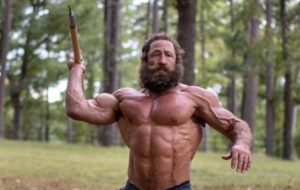“The most entertaining outcome (as if we were in a movie) is also the most likely,” Elon Musk declared recently. If Musk is right, then the next President of the United States must surely be swole, anti-vaccine boomer, Robert F. Kennedy Jr.
Kennedy, who is 69 years old, recently shared videos of himself lifting weights and doing press-ups shirtless. Alongside these, he pledged that should he become President, he will “restore America as the global example of health and well-being. Not through pills or syringes, but through character and self-discipline.”
The idea that physical and moral vigour go together is ancient. The first Olympic Games were held nearly three millennia ago, around 776BC, and many athletic-looking Greek statues survive to this day that vividly celebrate male physical beauty and strength as shorthand for good character.
This association persisted. In his 1855 poem “I Sing The Body Electric”, Walt Whitman celebrated human beauty as a fusion of character and embodiment, where flesh and gesture “are not the parts and poems of the body only, but of the soul”. According to Whitman, the “well-made man” expresses his character in both body and movement — all of which offers a clue as to character.
But fusing beauty and value lands differently today. The modern progressive mainstream has set itself firmly against the idea that our bodies say anything moral. Kennedy’s videos prompted a flurry of accusations that in showing off his muscular torso, he’s mired in toxic masculinity, dog-whistling body fascism and eugenics, and implicitly promoting discrimination against disabled people. And – perhaps most damningly of all for someone who promotes natural health – that he’s faking it: of using unnatural means to pump his muscles when in reality he’s old and weak.
Kennedy has not responded to the rumours about steroid use. But the argument hits a live and divisive issue on the Right: biotech. A significant chunk of his support comes from a cluster of emerging popular movements whose common theme is resistance to “unnatural” biotech innovations. He was a prominent opponent of Covid vaccine mandates, one such innovation; other issues in the same cluster include medical gender transition, and artificial meat – all of which inspire strong opposition as unacceptable incursions of technology into our nature.
So we might ask: how can Kennedy advocate health and wellbeing via character and self-discipline, and show off his ripped physique to underline the point, if he attained that physique with the help of synthetic hormones? It’s a fair question. But the collective shrug from Kennedy supporters suggests that what was gleefully pointed out as an inconsistency — an advocate of “natural” health possibly using medical tech to attain that health — is not, in fact, seen as contradictory in the slightest.
We take the opposition between tech and nature for granted today — not least because we’ve spent two centuries using tech to escape the limits of nature, and told ourselves this was a story of moral progress. This forms the backdrop — among other things — to the women’s movement, a story that wouldn’t have been possible without a host of now near-invisible technologies that underwrite women’s relative autonomy.
Beyond this, it forms the backdrop to progressivism in general. It’s not just women who now seek to escape the idea that our bodies say something about us: it’s everyone. From the disability rights movement to “body positivity”, the driving idea is that any judgement or constraint imposed by our contingent physical form should be challenged. Perhaps the logical endpoint of this challenge has been gender medicine’s all-out resistance to embodied limits, a politics that’s centrally about “pills and syringes” as liberation.
This utopian drive to break the bounds of human nature, then, began in earnest with the industrial era. As the world modernised, technology and a Protestant work ethic were applied not just to escaping our limits, but also to resisting our waning strength as physical work became less important. With the freshly-minted Land of the Free roaring from agrarian colonial backwater into industrial superpower, new anxieties proliferated about health, vitality and masculinity. In response, a “muscular Christianity” emerged which framed manly fitness as an expression of religious devotion — and whose many legacies include the still wildly popular sport of American football.
But it wasn’t just the Christians. As industrialisation made life easier and people richer and freer, so this new wealth and leisure drove an explosion in social and cultural experimentation in how to live well. In this free-for-all, a dizzying array of health entrepreneurs flourished, offering “water cures”, physiology lectures, anti-masturbation campaigns, sanatoria, and diets and lifestyles of such experimental weirdness, they make our 21st-century keto diets, NoFap forums and jade yoni eggs look positively normie.
Even Walt Whitman contributed to this emerging culture. Just three years after “I Sing The Body Electric” was published, he wrote a 13-instalment guide to Manly Health and Training in a New York newspaper, under the pseudonym “Mose Velsor”. In it, he sets out the intimate link between physical fitness, moral virtue — and also personal efficacy and performance. Training doesn’t just deliver a “perfect physique” but also helps a man “exalt the intensity of his personal force” — a transformation that will, in turn, “attract to him attention, friendship and respect”.
This mania for self-improvement tracked the wider transition in American culture, from largely agrarian to increasingly wealthy, entrepreneurial and technologically advanced. To succeed in this new era, the ambitious man had to grind. In other words, the fitness culture that emerged with modernity serves as a mirror of the machine age that spawned it: a “body electric” for the age of electrification, in which our physical forms become sites of industry-like labour and competition.
Today, we live in a biotech age, in which our flesh appears less in Whitmanesque terms — as union of body and soul — than as organs for donation; DNA for re-writing; a uterus for rent. We are raw material for the Fourth Industrial Revolution.
With this new turn has come another round of dematerialisation. Work is not just de-sexed, but virtualised. Life is sedentary. Happiness, risk-free sex, even weight management or the appearance of the opposite sex can be obtained in a pill or syringe. There’s no pressing reason to attain any level of physical fitness, except personal desire. And on top of these disintegrating forces, the dominant culture has also set itself (at least overtly) to the dissolution of physiological norms.
And just as industrial technologies spawned egalitarian challenges to our limits, and also new cults of the body beautiful, so today’s biotech age of hormone-enhanced affirmation and “inclusive” body culture has also given rise to a countervailing one, of aggressive physical beauty. One influential aspect of this backlash is a Right-wing subculture of bodybuilding, whose proponents oppose the progressive war on human nature along every possible axis. In general, adherents embrace effortful self-improvement, vitality and individual excellence, while dismissing “body positivity” and egalitarianism of every kind. Centrally, the RWBBs embrace the link expressed so controversially by Kennedy between physical health and moral worth — especially what health implies about individual effort and discipline.
Perhaps the most influential figure in this movement is the pseudonymous Bronze Age Pervert, whose Bronze Age Mindset decries egalitarianism as the attempt to abolish excellence and natural hierarchy in favour of meaningless “buglife”. His social media account abounds with “Handsome Thursday” images of honed male physiques, presented as aesthetic resistance to such levelling-down.
Unlike the 19th-century “muscular Christians”, this 21st-century fitness subculture draws inspiration more from the Hellenistic ancients, especially their sculptures of athletes. This affinity is so closely held that when a historian recently suggested ancient Greek soldiers would have been lean and tough, rather than “ripped”, he was deluged with furious anons, who accused him of self-interestedly attempting to legitimise “dad bods” and emasculation, and undermine men’s aspiration to physical beauty and strength, and — implicitly — to the superior character such beauty and strength have classically been viewed as reflecting.
But when such aspirations are located — as in the contested Greek soldiers — somewhere in the distant past, before the world modernised, what hope does anyone have of holding on to it? Critics sometimes accuse the RWBBs of clinging to a type of masculinity that has simply been rendered obsolete by changing social conditions. And maybe there’s something to that idea. Even “I Sing The Body Electric” expresses a palpable sense of loss at disappearing physical cultures: Whitman eulogises an agrarian grandfather hunting, boating and fishing with his many sons and grandsons. Hale and tan, loved by all, overwhelmingly magnetic, he’s a compelling figure – and was written in an era when that version of America was already disappearing.
Today, much as in the 19th century, we’re embroiled both in a tech-enabled war on human nature and a defence of that nature that is also tech-enabled — not least in how extremely online it is. But one upshot of this entanglement is that it might not, after all, be such a gotcha for Robert F. Kennedy Jr to be using testosterone replacement therapy to pursue the body beautiful.
Right-wing body-builders and their fellow travellers may decry the use of synthetic hormones for anti-normative ends, such as “transgender” medical interventions for children. But there’s far more ambivalence where it comes to using biotech to enhance human beauty and performance. For example, there’s no clear consensus in this community on whether using anabolic steroids is OK. And perhaps we shouldn’t be surprised if even those who criticise the use of tech to wage war on our nature might be less troubled about using tech to give nature a helping hand. After all, there’s no going back even to the 19th century, let alone the world of the hale, tanned farmers Whitman eulogises – or indeed of Greek hoplites. And, in theory at least, technology and desire can be turned to ends other than flattening every physical difference between individuals.
So perhaps this is the best we can hope for: diverting our “pills and syringes” from waging war on our nature, toward wielding them in support of human health and beauty. It’s a risky path, with many pitfalls. But with no obvious route back to a supposedly “natural” state, it may be that the only way out is through.
Disclaimer
Some of the posts we share are controversial and we do not necessarily agree with them in the whole extend. Sometimes we agree with the content or part of it but we do not agree with the narration or language. Nevertheless we find them somehow interesting, valuable and/or informative or we share them, because we strongly believe in freedom of speech, free press and journalism. We strongly encourage you to have a critical approach to all the content, do your own research and analysis to build your own opinion.
We would be glad to have your feedback.
Source: UnHerd Read the original article here: https://unherd.com/



